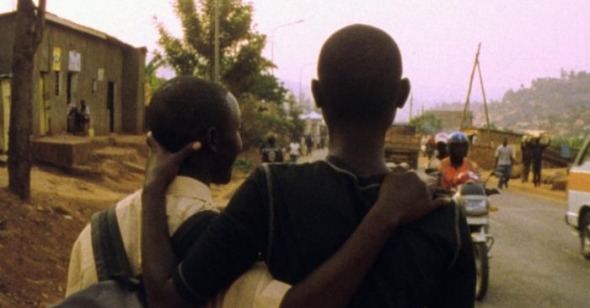Forward Thinking
by Elbert Ventura
Munyurangabo
Dir. Lee Isaac Chung, U.S./Rwanda, Film Movement
Munyurangabo boasts a provenance that would make a film festival programmer salivateâhere is a debut feature from Rwanda starring nonactors, written by a white American, and directed by a Korean-American. But the movieâs successful jog on the festival circuit, which included stops at Cannes and Toronto, can be attributed to more than its back story. Rough around the edges though it may be, director Lee Isaac Chungâs film is an intermittently lyrical and genuinely affecting work that at times even emits the shock of the new.
After a cryptic overture, we are introduced to Munyurangabo (Jeff Rutagengwa), or âNgabo for short, and Sangwa (Eric Ndorunkundiye) as they walk in slow motion down a Kigali road, arms around each other and seemingly carefree. The two are on a journey to an undisclosed destination, with a brief stopover with Sangwaâs family, who live in a rural village from which he fled three years earlier. Despite some early tension between father (Jean Marie Vianney Nkurikiyinka) and son, the sojourn proves a happy one for Sangwaâso much so that he tells âNgabo that he may have to continue on his journey alone. Complicating matters is Papa Sangwaâs barely disguised hatred for âNgabo, a Tutsi boy living under his Hutu roof. âNgabo himself chafes at the sight of Sangwa with his family. Itâs a reminder of what he lost in the genocide, and of his odysseyâs purpose: to find the man who killed his father and exact his revenge.
The first narrative feature to be made in the Kinyarwanda language, Munyurangabo strikes the proper balance between the ethnographic and the artistic. Chung and co-screenwriter Samuel Gray Anderson approached the project as an act of commemorationâa scrapbook giftâfor a culture with no film industry to speak of. By no means perfect, the film is nonetheless a vivid and reverential reflection of a country and its people. The tapestry of folk songs, stories, poetry, landscapes, and faces is nothing if not touching, a defiant statement of a cultureâs endurance. Cynics will undoubtedly sneer at Chungâs project, seeing in it nothing but exploitation by a privileged interloper: How presumptuous of a westerner to even think of offering such a âgiftâ! But such complaints are blind to whatâs onscreen and bespeak a narrow-mindedness thatâs inimical to art, not to mention at odds with the openhearted spirit that underpins Rwandaâs halting yet hopeful steps toward reconciliation.
Shot with a nonprofessional cast and crew in less than two weeks, Munyurangabo canât avoid a certain amateurishness. For all of its beautiful imageryâthe deep, dark reds of the soil and the lush greens of the countryside leave lasting imprints - there are moments of visual awkwardness: a mistimed cut, a ham-handed skyward pan. But the occasional raggedness and artless performances also lend the movie a measure of innocence and a jolt of immediacy.
That said, neorealism isnât quite the movieâs mode. Just as striking as its life-as-itâs-lived rawness is Chungâs stylistic approach. Chung understands the difference between anthropological actualitĂ© and film art. Throughout Munyurangabo, you can feel him fumbling for a personal style through pastiche. The cameraâs gaze straying toward treetops is Malickian; the recurring shots following the boys from behind are reminiscent of the Dardennes; a direct-address poetry performanceâa stirring highlightâcomes right out of Spike Lee. Chung isnât afraid to dabble in magic realism either: one of the first images is of a blood smear on a machete that mysteriously disappears when the camera pans back to the blade; one of the last is of âNgaboâs dead father sitting next to the boy, a mirage conjured up by a heartbroken orphan.
Thereâs perhaps too much ventriloquism and not enough of Chungâs own voice here, but itâs early yet for the director, and thereâs much to build on. What Munyurangabo does reveal about Chung is a finely calibrated feeling for cinema as both advocacy and art. Chung sees no need to sacrifice one for the otherâindeed, he appears to view the two as complementary. Itâs an alchemy that, when it really works in Munyurangabo, approaches something close to grace.
This article originally appeared on indieWIRE.
